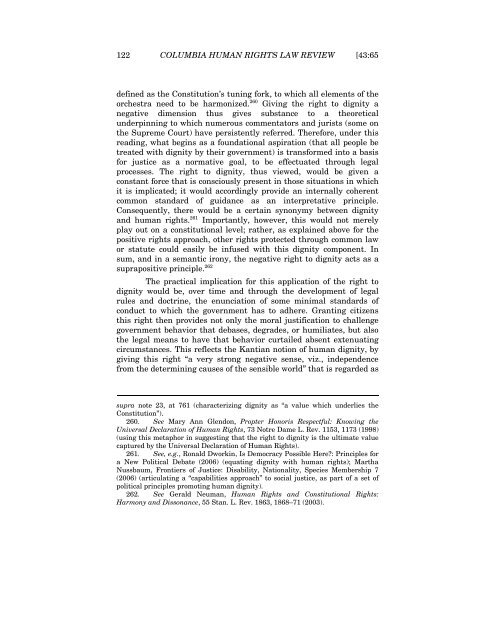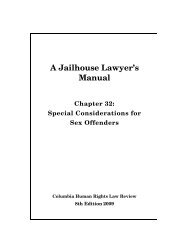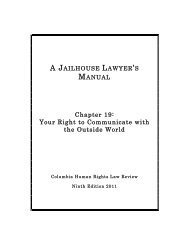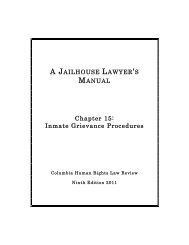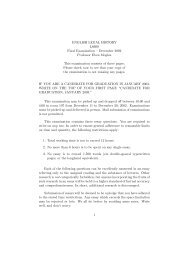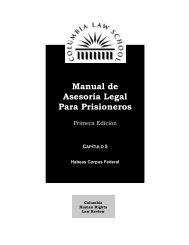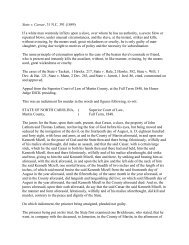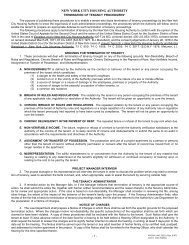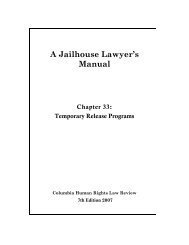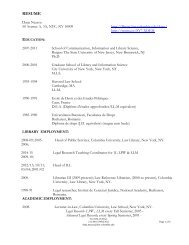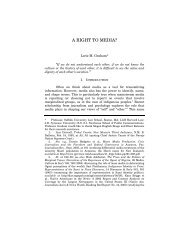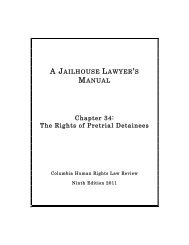The Right to Dignity Rex D. Glensy - Columbia Law School
The Right to Dignity Rex D. Glensy - Columbia Law School
The Right to Dignity Rex D. Glensy - Columbia Law School
Create successful ePaper yourself
Turn your PDF publications into a flip-book with our unique Google optimized e-Paper software.
122 COLUMBIA HUMAN RIGHTS LAW REVIEW [43:65<br />
defined as the Constitution’s tuning fork, <strong>to</strong> which all elements of the<br />
orchestra need <strong>to</strong> be harmonized. 260 Giving the right <strong>to</strong> dignity a<br />
negative dimension thus gives substance <strong>to</strong> a theoretical<br />
underpinning <strong>to</strong> which numerous commenta<strong>to</strong>rs and jurists (some on<br />
the Supreme Court) have persistently referred. <strong>The</strong>refore, under this<br />
reading, what begins as a foundational aspiration (that all people be<br />
treated with dignity by their government) is transformed in<strong>to</strong> a basis<br />
for justice as a normative goal, <strong>to</strong> be effectuated through legal<br />
processes. <strong>The</strong> right <strong>to</strong> dignity, thus viewed, would be given a<br />
constant force that is consciously present in those situations in which<br />
it is implicated; it would accordingly provide an internally coherent<br />
common standard of guidance as an interpretative principle.<br />
Consequently, there would be a certain synonymy between dignity<br />
and human rights. 261 Importantly, however, this would not merely<br />
play out on a constitutional level; rather, as explained above for the<br />
positive rights approach, other rights protected through common law<br />
or statute could easily be infused with this dignity component. In<br />
sum, and in a semantic irony, the negative right <strong>to</strong> dignity acts as a<br />
suprapositive principle. 262<br />
<strong>The</strong> practical implication for this application of the right <strong>to</strong><br />
dignity would be, over time and through the development of legal<br />
rules and doctrine, the enunciation of some minimal standards of<br />
conduct <strong>to</strong> which the government has <strong>to</strong> adhere. Granting citizens<br />
this right then provides not only the moral justification <strong>to</strong> challenge<br />
government behavior that debases, degrades, or humiliates, but also<br />
the legal means <strong>to</strong> have that behavior curtailed absent extenuating<br />
circumstances. This reflects the Kantian notion of human dignity, by<br />
giving this right “a very strong negative sense, viz., independence<br />
from the determining causes of the sensible world” that is regarded as<br />
supra note 23, at 761 (characterizing dignity as “a value which underlies the<br />
Constitution”).<br />
260. See Mary Ann Glendon, Propter Honoris Respectful: Knowing the<br />
Universal Declaration of Human <strong>Right</strong>s, 73 Notre Dame L. Rev. 1153, 1173 (1998)<br />
(using this metaphor in suggesting that the right <strong>to</strong> dignity is the ultimate value<br />
captured by the Universal Declaration of Human <strong>Right</strong>s).<br />
261. See, e.g., Ronald Dworkin, Is Democracy Possible Here?: Principles for<br />
a New Political Debate (2006) (equating dignity with human rights); Martha<br />
Nussbaum, Frontiers of Justice: Disability, Nationality, Species Membership 7<br />
(2006) (articulating a “capabilities approach” <strong>to</strong> social justice, as part of a set of<br />
political principles promoting human dignity).<br />
262. See Gerald Neuman, Human <strong>Right</strong>s and Constitutional <strong>Right</strong>s:<br />
Harmony and Dissonance, 55 Stan. L. Rev. 1863, 1868–71 (2003).


